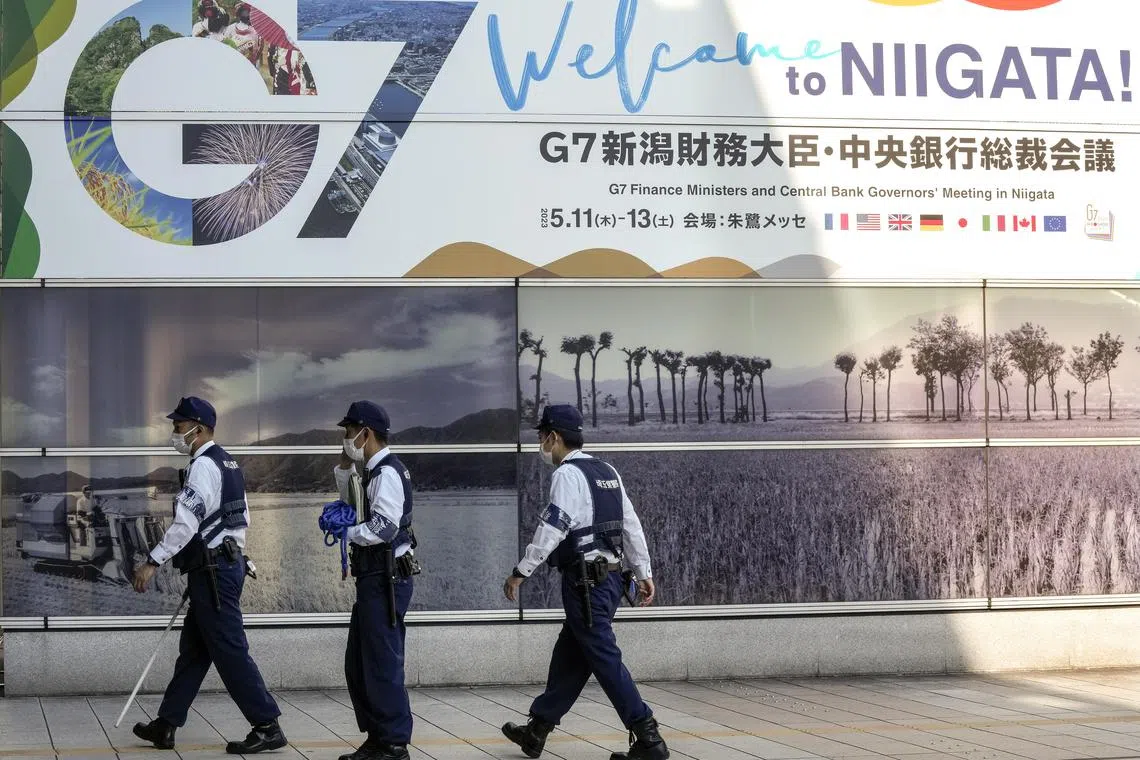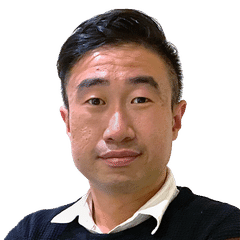DPM Lawrence Wong in Niigata, Japan, for G-7 meeting of finance chiefs
Sign up now: Get insights on Asia's fast-moving developments

Japan holds the presidency of the Group of Seven bloc in 2023.
PHOTO: EPA-EFE
NIIGATA, Japan – Singapore’s Finance Minister and Deputy Prime Minister Lawrence Wong is attending a meeting of finance chiefs and central bank governors from the Group of Seven (G-7) bloc of wealthy industrialised democracies in Niigata, where the Republic has been invited as an observer.
The three-day meeting that started on Thursday
Singapore is not a member of the G-7, or the Group of 20 (G-20) forum of major economies.
While the Republic has regularly been invited as an observer to G-20 meetings, this marks a rare occasion where Singapore is attending a G-7 meeting.
Japan holds the presidency of the G-7 bloc in 2023, and the Niigata meeting comes ahead of the Leaders’ Summit in Hiroshima from May 19 to 21. Singapore will not be represented at the Hiroshima summit.
Singapore’s Ministry of Finance (MOF) said in a statement on Thursday that the Niigata meeting will “discuss ways to strengthen economic and financial cooperation between emerging markets and developed economies”.
Mr Wong is accompanied on his official visit by officials from MOF.
South Korean broadcaster KBS World said Mr Wong would meet bilaterally with South Korean Deputy Prime Minister and Finance Minister Choo Kyung-ho.
The G-7 consists of Britain, Canada, France, Germany, Italy, Japan and the United States.
The European Union is a “non-enumerated member” that cannot host or chair a summit.
Singapore is one of six observer countries invited to attend the Niigata meeting.
The others are 2023’s G-20 chair India, Asean chair Indonesia and African Union chair Comoros, as well as South Korea and Brazil.
The countries invited to Hiroshima are Australia, Brazil, Comoros, Cook Islands (which chairs the Pacific Islands Forum in 2023), India, Indonesia, South Korea and Vietnam.
On the agenda at the Niigata meeting, which will be presided over by Japan’s Finance Minister Shunichi Suzuki and Bank of Japan governor Kazuo Ueda, are issues such as sanctions against Russia and US debt default fears
US Treasury Secretary Janet Yellen is attending the Niigata session, with the impasse over Washington’s debt ceiling threatening President Joe Biden’s in-person attendance at the Hiroshima summit.
A failure to avoid default will spark a global downturn, she said in Niigata, adding that it would “also risk undermining US global economic leadership and raise questions about our ability to defend our national security interests”.
Nomura Research Institute analyst Takahide Kiuchi told Reuters: “The G-7 will not be able to come up with a solution for what is a purely domestic and political US problem, though the group could reaffirm its resolve to cooperate in stabilising markets in the worst-case scenario.”
“Washington is solely responsible for getting this fixed,” he said. “But when things go wrong, all the other countries bear the brunt.”
The Niigata meeting will also likely result in a proposal by the G-7 to partner the World Bank to build more resilient supply chains, the Nikkei newspaper reported on Tuesday.
Their aim, the report said, is to help wean developing nations off their dependence on China for strategically important technologies pertaining to clean energy and infrastructure.
Dr Yellen on Thursday took aim at what she described as “economic coercion” on the part of China.
The G-7 also hopes to lift emerging economies beyond the extraction of resources such as rare earths, enabling them to manufacture products like electric vehicles and solar panels.
The Niigata gathering comes a month after finance chiefs and central bankers met in Washington, DC, where they pledged to “support low- and middle-income countries to play bigger roles in supply chains” through providing technical support, training and funding.
It also comes as the International Monetary Fund trimmed its 2023 global growth outlook to 2.8 per cent – down from 2.9 per cent – as it warned of financial system turmoil and persistently high inflation.
Three regional US banks Credit Suisse was acquired by its competitor UBS
“Concerns over banks’ credit-worthiness have yet to subside since the US regional bank failure,” Mr Suzuki said this week.
“We’re watching the situation with a strong sense of alarm, as markets and economies are globally intertwined.”
Asian Development Bank Institute senior research fellow John Beirne told The Straits Times: “Since the Washington meeting, amplified uncertainty on the outlook for the global economy should galvanise greater efforts for multilateral cooperation on monetary and fiscal policies aimed at enhancing global macroeconomic and financial resilience.”
How developing economies in the so-called Global South can play a key role in driving sustainable global growth will also likely be discussed, Dr Beirne said, adding: “G-7 efforts at repairing multilateralism are enhanced by fostering a partnership approach with non G-7 countries.”
Mr Wong is expected to return to Japan – in Tokyo – later in May to headline the 28th Nikkei conference on the Future of Asia.



